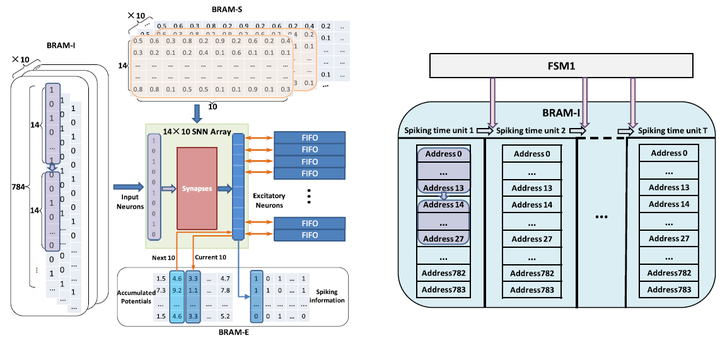
Abstract
In emerging Spiking Neural Network (SNN) based neuromorphic hardware design, energy efficiency and on-line learning are attractive advantages mainly contributed by bio-inspired local learning with nonlinear dynamics and at the cost of associated hardware complexity. This paper presents a novel SNN design employing fast COordinate Rotation DIgital Computer (CORDIC) algorithm to achieve fast spike timing–dependent plasticity (STDP) learning with high hardware efficiency. In this study, a system design and evaluation method of CORDIC-based SNN is proposed for finding optimal CORDIC type and precision, from theoretical CORDIC-level error to application-level learning performance. From the proposed design and evaluation method, a reconfigurable SNN design based on fast-convergence CORDIC is designed to achieve high classification accuracy on MNIST, fast on-line learning and good energy efficiency. By utilizing SNN’s fault tolerance and time-division-multiplexing (TDM) strategy, the reconfigurable SNN design employs 8-bit fast-convergence CORDIC and TDM-based hardware accelerator for high efficiency. FPGA implementation results confirm that the proposed fast-convergence CORDIC SNN design outperforms the state-of-the-art CORDIC method by 38.5%-45.3% in terms of learning speed and energy efficiency, with the STDP learning of 30.2 ns/SOP, energy efficiency of 176.6 pJ/SOP, processing speed of 6.1 ms/image, and on-line learning convergence of 21.4 s (time to reach the final accuracy, on average), on MNIST benchmark.
This paper was my first journal article, which inspired me to further study AI accelerators. Please note that the “code” is RTL-level code. The software simulation code is here: Software Simulation Codes. The RTL codes are not accessible now because we are doing some optmizations.